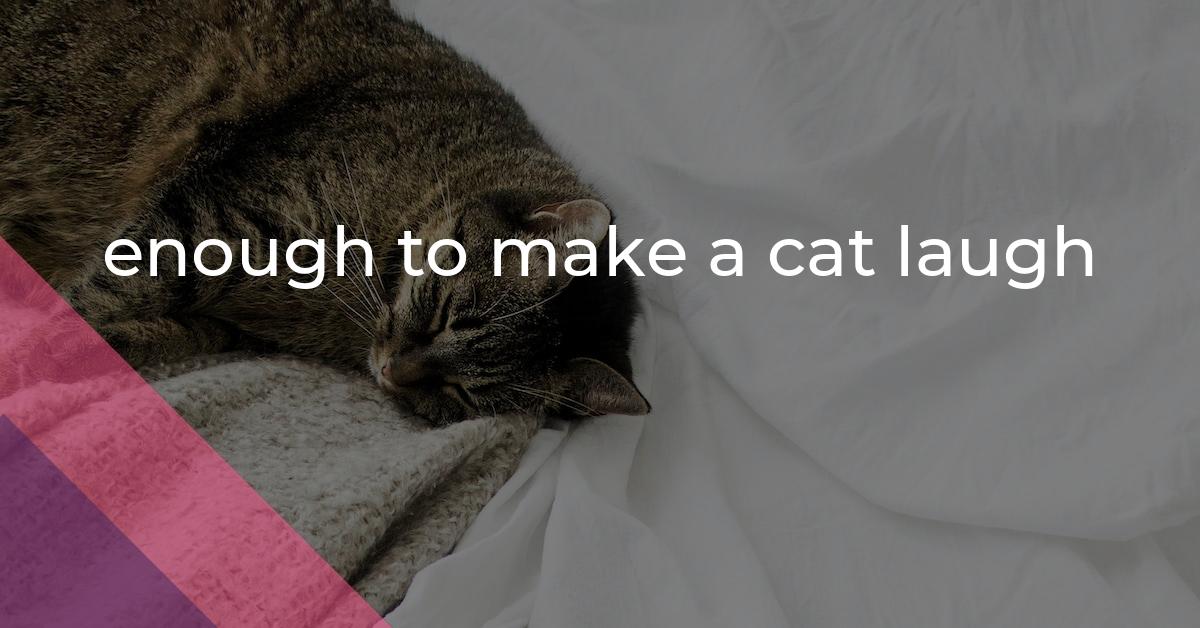enough to make a cat laugh: Idiom Meaning and Origin
What does ‘enough to make a cat laugh’ mean?
The idiom "enough to make a cat laugh" means something is extremely funny or ridiculous.

Idiom Explorer
The idiom "lead a cat-and-dog life" means to have a chaotic or constantly quarrelsome existence.
The idiom "laugh one's head off" means to laugh uncontrollably and excessively.
The idiom "laugh a minute" refers to someone or something that is consistently funny or amusing, providing frequent moments of laughter.
The idiom "laugh all the way to the bank" means to feel a sense of satisfaction or joy when you have made a lot of money or have been successful in financial matters.
The idiom "holy catfish" is an exclamation used to express surprise, astonishment, or disbelief. It is a lighthearted and humorous way to convey one's reaction to a surprising or unexpected event or situation.
The idiom "have had it up to here" means being extremely frustrated or fed up with something. It signifies reaching a limit or threshold of tolerance.
The idiom "have a laugh" means to find something amusing or entertaining and to enjoy a good laugh or joke.
The idiom "go too far" means to exceed the limits or boundaries of what is acceptable or reasonable.
The idiom "good enough to eat" means something is extremely delicious or attractive, to the point where one might want to consume or devour it.
When something is described as "good enough for jazz," it means it is of a high standard or quality. This idiom is often used to emphasize that something is excellent or impressive.
Laughter of Feline Proportions
The idiom "enough to make a cat laugh" is an interesting and somewhat obscure phrase that is not commonly used in everyday conversation. Its origin and exact meaning are not widely known, but some facts can be gathered from available sources on the internet.
Firstly, the phrase suggests a sense of humor or amusement associated with cats. Cats are playful animals, known for their ability to entertain and bring joy to their owners. However, the specific reason behind why a cat's laughter would be considered humorous remains unclear.
It is worth noting that the idiom is not commonly used in contemporary English. This indicates that the phrase might have originated from an earlier era or been confined to more specific linguistic contexts. Its limited usage raises questions about its popularity and acceptance in modern language, making it a curious and intriguing idiom to explore.
Further research into the idiom reveals that its usage is predominantly found in British English, suggesting a potential British origin. However, there is insufficient evidence to determine conclusively whether the phrase originated in the United Kingdom or if it has more widespread usage in other English-speaking countries.
While the exact meaning of the idiom is open to interpretation, it generally implies an absurd or laughable situation. The phrase implies that something is so comical or ridiculous that even a cat, known for its low threshold for amusement, would find it amusing. It conveys a sense of amusement at a situation that is beyond normal expectations or conventional standards of humor.
The idiom can be used to express skepticism or cynicism towards a particular event or situation. It can be employed to highlight the incongruity or incredulity of a claim, emphasizing its lack of credibility or believability. By using this idiom, one underscores the implausibility or absurdity of a statement or assertion, downplaying its merit or legitimacy.
The phrase "enough to make the angels weep" also conveys a similar sense of absurdity or extreme emotion. It suggests that something is so heartbreaking or tragic that it would move even the celestial beings to tears. This idiom emphasizes the intensity of emotion or the gravity of a situation, underscoring its profound impact.
Additionally, the idiom "have a laugh" is related to the phrase "enough to make a cat laugh." "Have a laugh" means to enjoy oneself or have fun in a lighthearted manner. It implies a sense of amusement or enjoyment derived from a particular activity or situation. Both idioms emphasize the idea of finding humor or joy in a given context, albeit in different ways.
The idiom "enough to make a cat laugh" captures the essence of something incredibly humorous or laughable. Its exact origins and specific usage remain elusive, adding an air of mystery to its meaning. Despite its relative obscurity in modern language, the idiom presents an opportunity for further exploration and appreciation of the richness and complexity of idiomatic expressions.
Example usage
Examples of how the idiom "enough to make a cat laugh" can be used in a sentence are:
- He thought his joke was so funny but it was enough to make a cat laugh.
- The magician's failed trick was enough to make a cat laugh.
- Her attempt at singing was so terrible, it was enough to make a cat laugh.
More "Humor" idioms



